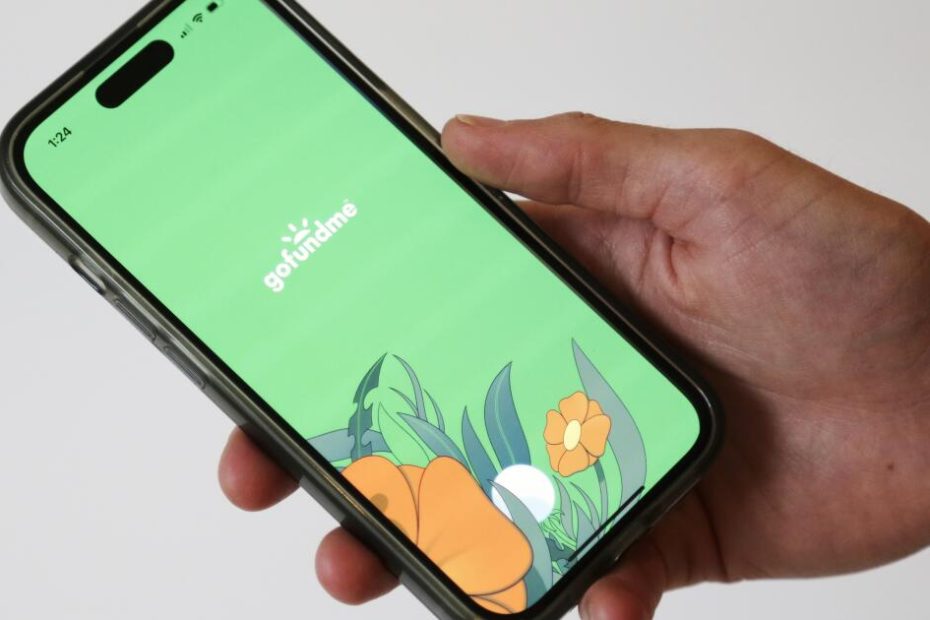Los Angeles Fire: Is the GoFundMe account legitimate? How to spot scams when helping victims
Thousands of online GoFundMe fundraising campaigns have been launched to support victims of the devastating wildfires that have burned parts of Los Angeles County, but officials are warning to be wary of fraudulent GoFundMe accounts.
Since the first wildfires ignited Tuesday morning, a GoFundMe campaign started by and on behalf of fire victims has taken off, asking for any kind of financial support for relief, reconstruction, immediate short-term lodging, clothing and other emergency needs.
Close friends of Erin Berkowitz, a natural dye artist who lost her Altadena home in the Eaton Fire, launched a GoFundMe fundraiser Wednesday night to help Help replace art materials and supplies she lost in the fire. But by Thursday morning, she learned that a fake Instagram account was impersonating her and sharing fake GoFundMe fundraiser links to friends and other followers.
“They copied my photo and my bio on their social media and our usernames were almost identical and they just underlined part of them,” she said.
The fake GoFundMe has her exact information; the only difference is a slightly different web URL.
Berkowitz and her friends and family immediately reported the fake account, and the fundraiser was immediately taken down within 24 hours.
“Dealing with this in the worst moments of my life, like the scariest, most disturbing, saddest moments of my life,” she said. “What happened was also very concerning and stressful.”
To help combat this type of fraud, GoFundMe has created a centralized online hub of all verified fundraising pages related to the Los Angeles area wildfires.
Los Angeles County District 5 Supervisor Kathryn Barger also urged people to donate but be wary of online fundraisers, especially GoFundMe.
“You've got a scam going on. You've got a GoFundMe that's not legitimate,” Barger said. “If it doesn’t pass the smell test or sounds too good to be true – for God’s sake, call my office and I’ll flush it out for you, but please don’t fall for these scams. “
Here are tips on how GoFundMe verifies fundraisers on its platform, charges fees and includes prompts in the donation process, and how to check whether a campaign is legitimate.
How GoFundMe Verifies a Fundraiser
As of Monday evening, there were 103 pages on the hub involving more than 1,200 active and verified GoFundMe fundraisers.
A GoFundMe spokesperson said that for a fundraiser to be considered verified, it “must go through an enhanced due diligence review process” that includes human and technological tools designed to detect abuse.
The company said members of its Trust and Safety team work directly with fundraiser organizers to confirm their connection to the individuals or families for whom they are raising funds and help them set up beneficiaries.
“When a fundraiser is launched to help someone other than the organizer, the funds are held securely by our payment processor until the beneficiary's information is verified and then transferred directly to the GoFundMe recipient,” the spokesperson said.
Once fundraisers are verified, they are added to the centralized hub.
If people who want to donate to the fundraiser have questions about it, GoFundMe encourages people to use the contact button to contact the organizers and ask them directly any questions.
If an inquiry goes unanswered or someone has concerns about a fundraising event, they should be reported to the company. Anyone can alert the company to suspicious activity by clicking the “Report Fundraising Activity” button. This will prompt an immediate investigation to verify the legitimacy of the activity.
When officials investigate and discover that a fundraiser was fraudulent, any donors will be refunded. With the GoFundMe Donation Guarantee, the company guarantees donors a full refund.
“GoFundMe has zero tolerance for abuse of our platform and cooperates with law enforcement investigations of those accused of wrongdoing,” the spokesperson said.
How much does it cost to donate on GoFundMe?
When a person donates to a GoFundMe fundraiser, the standard transaction fee is 2.9%, plus 30 cents per donation.
The fee helps the company “pay payment processors and securely deliver funds,” according to a company spokesperson.
What is the “Alert” feature when I want to donate on GoFundMe?
Once a donor clicks the “Donate” button, they are taken to a page where they can choose to make a one-time or monthly monetary donation and include the amount they want to donate.
Just below that is the “Tip GoFundMe Service” feature, which automatically sets the tip to 14% of the amount you give to the fundraiser. Tip amounts go directly to the GoFundMe company. This amount can be reduced to zero or increased to 35% of the gift amount.
According to the company, the tipping feature is completely voluntary.
“GoFundMe is powered primarily by voluntary tips and relies on these completely optional contributions from donors to maintain our superior customer service, trust and safety protections, and world-class fundraising technology,” a company spokesperson said.
How can I tell if a fundraiser is legitimate if it's unverified?
GoFundMe officials and other experts encourage people who want to donate to GoFundMe campaigns to do some research before becoming a donor.
Check out the fundraising page. Check that your fundraiser has a clear title, image, and story description. Check the description for typos or misspellings.
Substantiate the description of the fundraising event. Consumer Action spokesperson Ruth Susswein said cross-referencing details in the description or fundraiser with social media accounts or local news reports.
You can also use online search engines like Spokeo to confirm someone's contact information, including their address.
You can also check if an image is AI-generated, edited, or of photo origin by putting it into the Google reverse image search tool.
Understand how funds are used. What is the purpose of fundraising? Are organizers transparent about how funds are used?
Check beneficiary connections: What is the relationship between organizers and recipients of funds?
Check out the comments and donate: Did an immediate family member, friend, or community member donate and leave a supportive comment?
More importantly, trust your gut.
“If you feel like something is wrong, assume you're right and trust that feeling,” Suswein said.
Times staff writer Grace Toohey contributed to this report.










